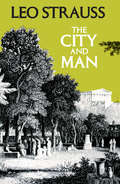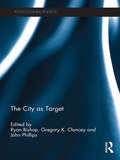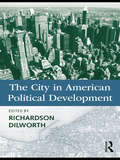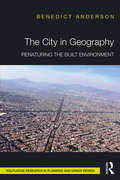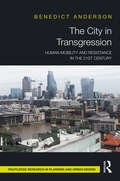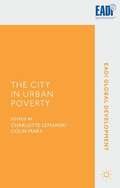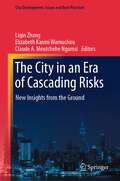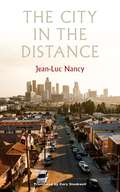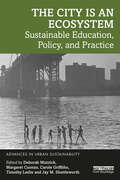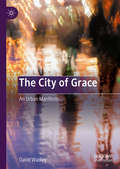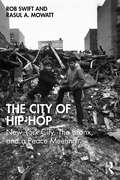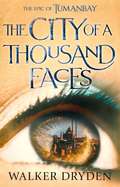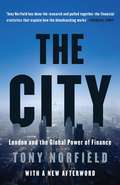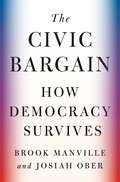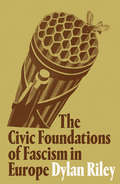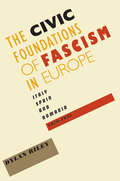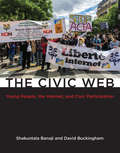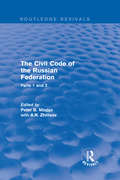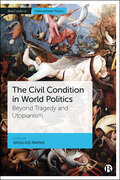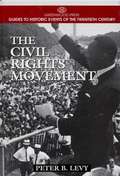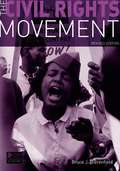- Table View
- List View
The City and Man
by Leo StraussThe provocative essays constitute a brilliant attempt to use classical political philosophy as a means of liberating modern political philosophy from the stranglehold of ideology.
The City as Target (Postcolonial Politics)
by John Phillips Gregory K. Clancey Ryan BishopBringing together scholars from a diverse range of disciplines, The City as Target provides a sustained and critical response to the relationship between the concept of targeting (in its many forms) and notions of understanding, imagining and shaping the urban. Among the many spatial and graphic terms used to describe cities in urban studies, the word target is rarely encountered. Though equally spatial, it differs from these others by implying some motive force, and, more than that, a force with some intentionality. To target is to aim, to project, and ultimately to impact. It suggests a space of violence, or at least action, or movement resulting in displacement, which most other terms do not. In that sense it is useful, underused, and perhaps revelatory. Rather than approach the city as simply a site of growth, processes, and developments, the contributors to this volume treat it as the recipient of attentions. The work draws on a wide variety of geographical sites and historic monuments in order to explore this concept, examining and challenging current urban theories. It seeks to highlight both the power of The Global City and the current vulnerability and fragility of urban culture, exploring the city as a recipient and a culprit in relation to issues including terrorism and urban warfare, the latest cyclical failure of global financial markets, and the relatively new spectre of environmental unsustainability. Offering a unique and relevant contribution to the literature, this work will be of great interest to scholars of urban theory, international relations, postcolonial politics and military studies.
The City in American Political Development
by Richardson DilworthThere are nearly 20,000 general-purpose municipal governments—cities—in the United States, employing more people than the federal government. About twenty of those cities received charters of incorporation well before ratification of the U.S. Constitution, and several others were established urban centers more than a century before the American Revolution. Yet despite their estimable size and prevalence in the United States, city government and politics has been a woefully neglected topic within the recent study of American political development. The volume brings together some of the best of both the most established and the newest urban scholars in political science, sociology, and history, each of whom makes a new argument for rethinking the relationship between cities and the larger project of state-building. Each chapter shows explicitly how the American city demonstrates durable shifts in governing authority throughout the nation’s history. By filling an important gap in scholarship the book will thus become an indispensable part of the American political development canon, a crucial component of graduate and undergraduate courses in APD, urban politics, urban sociology, and urban history, and a key guide for future scholarship.
The City in Geography: Renaturing the Built Environment
by Benedict AndersonMonumental in scale and epic in development, cities have become the most visible and significant symbol of human progress. The geography on and around which they are constructed, however, has come to be viewed merely in terms of its resources and is often laid to waste once its assets have been stripped. The City in Geography is an urban exploration through this phenomenon, from settlement to city through physical geography, which reveals an incremental progression of removing terrain, topography and geography from the built environment, ushering in and advancing global destruction and instability. This book explains how the fall of geography in relationship to human survival has come through the loss of contact between urban dwellers and physical terrain, and details the radical rethinking required to remedy the separations between the city, its inhabitants and the landscape upon which it was built.
The City in Transgression: Human Mobility and Resistance in the 21st Century
by Benedict AndersonThe City in Transgression explores the unacknowledged, neglected, and ill-defined spaces of the built environment and their transition into places of resistance and residence by refugees, asylum seekers, migrants, the homeless, and the disadvantaged. The book draws on urban and spatial theory, socio-economic factors, public space, and architecture to offer an intimate look at how urban sites and infrastructure are transformed into spaces for occupation. Anderson proposes that the varied innovations and adaptations of urban spaces enacted by such marginalized figures – for whom there are no other options – herald a radical new spatial programming of cities. The book explores cities and sites such as Mexico City and London, the Mexican/US border, the Calais Jungle, and Palestinian camps in Beirut and utilizes concepts associated with ‘mobility’ – such as anarchy, vagrancy, and transgression – alongside photography, 3D modelling, and 2D imagery. From this constellation of materials and analysis, a radical spatial picture of the city in transgression emerges. By focusing on the ‘underside of urbanism’, The City in Transgression reveals the potential for new spatial networks that can cultivate the potential for self-organization so as to counter the existing dominant urban models of capital and property and to confront some of the major issues facing cities amid an age of global human mobility. This book is valuable reading for those interested in architectural theory, modern history, human geography and mobility, climate change, urban design, and transformation.
The City in Urban Poverty
by Charlotte Lemanski Colin MarxThe authors respond to the absence of critical debate surrounding the spaces of the city in urban poverty research and policy. While existing research interprets the urban as a static container or empty backdrop for urban poverty processes, the chapters in this book critically explore the active role played by the spaces of the city in shaping and perpetuating urban poverty. Scholars and policymakers from a range of disciplinary perspectives use historic and contemporary examples from Asia,Africa and Latin America to demonstrate the ways in which urban poverty does not just exist in the spaces of the city, but that the city itself is also in urban poverty. So the city is both in and of urban poverty (and vice versa). Attending to the way that spaces of cities are part of the processes that reproduce and perpetuate exploitation and inequality sheds additional light on the dynamics of poverty for researchers and policy makers.
The City in an Era of Cascading Risks: New Insights from the Ground (City Development: Issues and Best Practices)
by Liqin Zhang Elizabeth Kanini Wamuchiru Claude A. Meutchehe NgomsiThis book provides unique perspectives into newly changed political and socioeconomic urban landscapes due to COVID-19 in diverse cities and aims to provide ways to improve the resilience of cities using a global perspective, especially in a post-pandemic era. This book is divided into three sections with seventeen chapters overall. It explores the impacts of the COVID-19 on city planning, building, and maintenance; it considers city resilience and what urban risks cities are facing; and it examines urban development from diverse socioeconomic and political perspectives. The book contains multidisciplinary work by authors from China, African nations (Angola, Burundi, Cameroon, Kenya, Morocco, Nigeria), Canada, Italy, Poland, and France. This manuscript provides a global perspective as cities from Africa, China, as well as some developed countries, such as France and South Korea, were used to collect data and information concerning urban development and risks, past, present, and future responses to COVID-19 as well as any other pandemics and cities' resilience. This book is a valuable asset to urban researchers, urban city planners, urban policymakers, public officials, undergraduates, and postgraduates interested in a comprehensive comparison between diverse socioeconomic and political cities with a unique global and post-pandemic perspective in order to improve urban city resilience.
The City in the Classical and Post-Classical World
by Claudia Rapp H. A. DrakeThis volume examines the evolving role of the city and citizenship from classical Athens through fifth-century Rome and medieval Byzantium. Beginning in the first century CE, the universal claims of Hellenistic and Roman imperialism began to be challenged by the growing role of Christianity in shaping the primary allegiances and identities of citizens. An international team of scholars considers the extent of urban transformation, and with it, of cultural and civic identity, as practices and institutions associated with the city-state came to be replaced by those of the Christian community. The twelve essays gathered here develop an innovative research agenda by asking new questions: What was the effect on political ideology and civic identity of the transition from the city culture of the ancient world to the ruralized systems of the middle ages? How did perceptions of empire and oikoumene respond to changed political circumstances? How did Christianity redefine the context of citizenship?
The City in the Distance
by Jean-Luc NancyFINALIST, 38th ANNUAL FRENCH-AMERICAN FOUNDATION TRANSLATION PRIZEExploring the ever-changing philosophy of city life with Jean-Luc NancyIn The City in the Distance, Jean-Luc Nancy embarks on nothing less than a philosophy of the city. Drawing on his widely discussed accounts of sense and of the fraught question of community, Nancy views the city as the site of a disposition that is constantly undergoing metamorphoses.Far from an abstract account, Nancy attends in the most concrete way possible to the workings of a city not typically taken as paradigmatic, Los Angeles. As Jean-Christophe Bailly suggests in his foreword, Nancy joins Walter Benjamin in thinking the city not from an external vantage point, but on its own terms.
The City is an Ecosystem: Sustainable Education, Policy, and Practice (Advances in Urban Sustainability)
by Margaret Cuonzo Deborah Mutnick Carole Griffiths Timothy Leslie Jay M. ShuttleworthThe City is an Ecosystem maps an interdisciplinary, community-engaged response to the great ecological crises of our time—climate change, biodiversity loss, and social inequality—which pose particular challenges for cities, where more than half the world’s population currently live. Across more than twenty chapters, the three parts of the book cover historical and scientific perspectives on the city as an ecosystem; human rights to the city in relation to urban sustainability; and the city as a sustainability classroom at all educational levels inside and outside formal classroom spaces. It argues that such efforts must be interdisciplinary and widespread to ensure an informed public and educated new generation are equipped to face an uncertain future, particularly relevant in the post-COVID-19 world. Gathering multiple interdisciplinary and community-engaged perspectives on these environmental crises, with contemporary and historical case study discussions, this timely volume cuts across the humanities and social and health sciences, and will be of interest to policymakers, urban ecologists, activists, built environment professionals, educators, and advanced students concerned with the future of our cities.
The City of Grace: An Urban Manifesto
by David WadleyIn this sweeping appraisal of the urban condition, David Wadley argues that anything less that high-level resolution in modelling the well-being of inhabitants is wasting precious time. Humanity is encountering rising entropy, caused by unsustainable economic and demographic expansion. Supported by a strong interdisciplinary backdrop featuring systems and crisis theories, The City of Grace tackles these obstacles by picturing gracious function and graceful form in a human-scale settlement. In an attempt to salvage things lost in the teleology of urban development over the last 100 years, the outlook is both heterodox and contrarian. How long can we all go on in the present way? In addressing grace, a more elevated concept than those focusing previous urban analyses, this manifesto aims not to placate or please but, instead, to get humanity to face the encompassing realities it tries so hard to forget.
The City of Hip-Hop: New York City, The Bronx, and a Peace Meeting
by Rob Swift Rasul A. MowattThe City of Hip-Hop positions a unique conceptualization of the history of Hip-Hop, that it was a combination of forces that produced the environment for Hip-Hop to specifically grow in the geographies of New York City and its boroughs. This book argues it was the political forces of the 1970s combined with the economic forces of free market capitalism and privatization of public services, neoliberalism, and the social forces of the deindustrialization of major cities and displacement of populations that led the cultural creation of the “Boogie Down” Bronx. The City of Hip-Hop shows how Hip-Hop is a socio-political reaction that created an alternate reality with a geographic specificity, and it is the interplay with those forces that nurtured it to become the culture force that we know it today in New York, Philadelphia, Boston, Los Angeles, Chicago, London, Manchester, Liverpool, Berlin, São Paulo, Tokyo, Washington D.C., Seattle, Paris, Houston, Dallas, Miami, Atlanta, Detroit, Toronto, Cleveland, Johannesburg, Barcelona, Belfast, Gaza City, and elsewhere. Once those of us as fans of the culture zoom out to see such a bigger picture, a much-needed criticism and retelling of the culture and art of Hip-Hop emerges as our understanding.This book is essential for preservers of the culture, students, scholars, and general readers interested in urban planning, urban design, urban geography, place-making, American Studies, Cultural Studies, Black Studies, and Latin American Studies.
The City of a Thousand Faces: A sweeping historical fantasy saga based on the hit podcast Tumanbay
by Walker Dryden'A complex, gorgeous and compelling tapestry of love, death, trust and betrayal' - Daily Mail A sweeping historical fantasy saga based on the hit podcast Tumanbay ******'Immersive, rich, compelling and populated with characters who come alive on the page, it will transport you to a different world. I loved it and didn't want it to end.' - Sarah Lotz, author of The Three'Written with the finesse of a master-assassin's dagger... I could not put it down!' Christian Cameron******Tumanbay: the most magnificent city on earth. The beating heart of a vast empire. A city of dreams - where those who arrived as slaves now reside in the seat of power.But the wheel of fate is never still: from the gilded rooftops to the dark catacombs, there are secrets waiting to be uncovered.For Gregor, Master of the Palace Guard, the work of rooting out spies and traitors is never done. His brother, the great General Qulan, must quell a distant rebellion. Whilst Shajah, chief wife to the Sultan, is suspicious that her new maid Sarah is not who she claims to be.And a mysterious stranger arrives with a gift for the Sultan himself.A gift that will change Tumanbay forever...******'The writing and imagery are flawless, taking you right into the heart of the story and characters. While I was reading, this was MY world, and you can't ask for more than that from a fantasy novel.' Reader review (five stars)
The City of a Thousand Faces: A sweeping historical fantasy saga based on the hit podcast Tumanbay
by Walker Dryden'A complex, gorgeous and compelling tapestry of love, death, trust and betrayal' - Daily Mail A sweeping historical fantasy saga based on the hit podcast Tumanbay ******'Immersive, rich, compelling and populated with characters who come alive on the page, it will transport you to a different world. I loved it and didn't want it to end.' - Sarah Lotz, author of The Three'Written with the finesse of a master-assassin's dagger... I could not put it down!' Christian Cameron******Tumanbay: the most magnificent city on earth. The beating heart of a vast empire. A city of dreams - where those who arrived as slaves now reside in the seat of power.But the wheel of fate is never still: from the gilded rooftops to the dark catacombs, there are secrets waiting to be uncovered.For Gregor, Master of the Palace Guard, the work of rooting out spies and traitors is never done. His brother, the great General Qulan, must quell a distant rebellion. Whilst Shajah, chief wife to the Sultan, is suspicious that her new maid Sarah is not who she claims to be.And a mysterious stranger arrives with a gift for the Sultan himself.A gift that will change Tumanbay forever...******'The writing and imagery are flawless, taking you right into the heart of the story and characters. While I was reading, this was MY world, and you can't ask for more than that from a fantasy novel.' Reader review (five stars)
The City: London and the Global Power of Finance
by Tony NorfieldRadical insider's account of how the city of London really worksThe City, as London's financial centre is known, is the world's biggest international banking and foreign exchange market, shaping the development of global capital. It is also, as this groundbreaking book reveals, a crucial part of the mechanism of power in the world economy. Based on the author's twenty years' experience of City dealing rooms, The City is an in-depth look at world markets and revenues that exposes how this mechanism works. All big international companies--not just the banks--utilise this system, and The City shows how the operations of the City of London are critical both for British capitalism and for world finance. Tony Norfield details, with shocking and insightful research, the role of the US dollar in global trading, the network of Britishlinked tax havens, the flows of finance around the world and the system of power built upon financial securities. Why do just fifty companies now have control of a large share of world economic production? The City explains how this situation came about, examining the history of the world economy from the postwar period to the present day. If you imagine you don't like "finance" but have no problem with the capitalist market system, think again: it turns out the two cannot be separated.
The Civic Bargain: How Democracy Survives
by Josiah Ober Brook ManvilleA powerful case for democracy and how it can adapt and survive—if we want it toIs democracy in trouble, perhaps even dying? Pundits say so, and polls show that most Americans believe that their country’s system of governance is being “tested” or is “under attack.” But is the future of democracy necessarily so dire? In The Civic Bargain, Brook Manville and Josiah Ober push back against the prevailing pessimism about the fate of democracy around the world. Instead of an epitaph for democracy, they offer a guide for democratic renewal, calling on citizens to recommit to a “civic bargain” with one another to guarantee civic rights of freedom, equality, and dignity. That bargain also requires them to fulfill the duties of democratic citizenship: governing themselves with no “boss” except one another, embracing compromise, treating each other as civic friends, and investing in civic education for each rising generation.Manville and Ober trace the long progression toward self-government through four key moments in democracy’s history: Classical Athens, Republican Rome, Great Britain’s constitutional monarchy, and America’s founding. Comparing what worked and what failed in each case, they draw out lessons for how modern democracies can survive and thrive. Manville and Ober show that democracy isn’t about getting everything we want; it’s about agreeing on a shared framework for pursuing our often conflicting aims. Crucially, citizens need to be able to compromise, and must not treat one another as political enemies. And we must accept imperfection; democracy is never finished but evolves and renews itself continually. As long as the civic bargain is maintained—through deliberation, bargaining, and compromise—democracy will live.
The Civic Culture Transformed
by Russell J. Dalton Christian WelzelThis book reevaluates Almond, Verba, and Pye's original ideas about the shape of a civic culture that supports democracy. Marshaling a massive amount of cross-national, longitudinal public opinion data from the World Values Survey Association, the authors demonstrate multiple manifestations of a deep shift in the mass attitudes and behaviors that undergird democracy. The chapters in this book show that in dozens of countries around the world, citizens have turned away from allegiance toward a decidedly "assertive" posture to politics: they have become more distrustful of electoral politics, institutions, and representatives and are more ready to confront elites with demands from below. Most importantly, societies that have advanced the most in the transition from an allegiant to an assertive model of citizenship are better-performing democracies - in terms of both accountable and effective governance.
The Civic Foundations of Fascism in Europe: Italy, Spain, And Romania, 1870-1945
by Dylan RileyA historical look at the emergence of fascism in EuropeDrawing on a Gramscian theoretical perspective and development a systematic comparative approach, The Civic Foundations of Fascism in Europe: Italy, Spain and Romania 1870-1945 challenges the received Tocquevillian consensus on authoritarianism by arguing that fascist regimes, just like mass democracies, depended on well-organized, rather than weak and atomized, civil societies. In making this argument the book focuses on three crucial cases of inter-war authoritarianism: Italy, Spain and Romania, selected because they are all counter-intuitive from the perspective of established explanations, while usefully demonstrating the range of fascist outcomes in interwar Europe. Civic Foundations argues that, in all three cases, fascism emerged because the rapid development of voluntary associations combined with weakly developed political parties among the dominant class thus creating a crisis of hegemony. Riley then traces the specific form that this crisis took depending on the form of civil society development (autonomous- as in Italy, elite dominated as in Spain, or state dominated as in Romania) in the nineteenth century.
The Civic Foundations of Fascism in Europe: Italy, Spain, and Romania, 1870–1945
by Dylan RileyDylan Riley reconceptualizes the nature and origins of interwar fascism in this remarkable investigation of the connection between civil society and authoritarianism.From the late nineteenth century to World War I, voluntary associations exploded across Europe, especially among rural non-elites. But the development of this "civil society" did not produce liberal democracy in Italy, Spain, and Romania. Instead, Riley finds that it undermined the nascent liberal regimes in these countries and was a central cause of the rise of fascism. Developing an original synthesis of Gramsci and Tocqueville, Riley explains this surprising outcome by arguing that the development of political organizations in the three nations failed to keep pace with the proliferation of voluntary associations, leading to a crisis of political representation to which fascism developed as a response. His argument shows how different forms of fascism in Italy, Spain, and Romania arose in response to the divergent paths taken by civil society development in each nation.Presenting the seemingly paradoxical argument that the rapid development of civil society facilitated the rise of fascism in Italy, Spain, and Romania, Riley credibly challenges the notion that a strong civil society necessarily leads to the development of liberal democracy. Scholars and students interested in debates about the rise of fascism and authoritarianism, democratization, civil society, and comparative and historical methods will find his arguments compelling and his conclusions challenging.
The Civic Web: Young People, the Internet, and Civic Participation (The John D. and Catherine T. MacArthur Foundation Series on Digital Media and Learning)
by Shakuntala Banaji David BuckinghamAn investigation of how governments, organizations, and groups use the Internet to promote civic and political engagement among young people.There has been widespread concern in contemporary Western societies about declining engagement in civic life; people are less inclined to vote, to join political parties, to campaign for social causes, or to trust political processes. Young people in particular are frequently described as alienated or apathetic. Some have looked optimistically to new media—and particularly the Internet—as a means of revitalizing civic life and democracy. Governments, political parties, charities, NGOs, activists, religious and ethnic groups, and grassroots organizations have created a range of youth-oriented websites that encourage widely divergent forms of civic engagement and use varying degrees of interactivity. But are young people really apathetic and lacking in motivation? Does the Internet have the power to re-engage those disenchanted with politics and civic life? Based on a major research project funded by the European Commission, this book attempts to understand the role of the Internet in promoting young people's participation. Examples are drawn from Hungary, the Netherlands, Slovenia, Spain, Sweden, Turkey, and the United Kingdom—countries offering contrasting political systems and cultural contexts. The book also addresses broader questions about the meaning of civic engagement, the nature of new forms of participation, and their implications for the future of civic life.
The Civically Engaged Reader: A Diverse Collection of Short Provocative Readings on Civic Activity
by Adam Davis Elizabeth LynnWe all know that reflection is a key component of effective service and civic engagement. This book is a must-have resource, a compendium of writing from diverse times and voices guaranteed to stimulate lively conversation and hard thinking." -- Elizabeth Hollander, executive director, Campus Compact This book is for anyone who has ever tossed a dime in a panhandler's cup--or had one tossed in his own. It's for anyone who has ever served at a soup kitchen, volunteered to bake cookies, tutored a child, or fought a war. Admittedly, it raises as many questions as it answers and complicates as much as it simplifies. But if you've ever considered the possibility of a better world, and reflected on how you might take part in such a place, this is the book to take along for the journey." -- Billy Lombardo, author of The Logic of a Rose: Chicago Stories and former Service Learnign Program director at the Latin School of Chicago The Civically Engaged Reader assembles more than forty provocative and diverse readings that range across literature, philosophy, and religion. These selections invite reflection on all kinds of civic-minded activities--from giving and serving to leading and associating--and on the vital connections between thought and service. The selections in The Civically Engaged Reader will stimulate both individual contemplation and lively group discussion and debate. Appendixes with questions for discussion and tips for making those discussions meaningful make this anthology a ready-to-go resource for service and volunteer groups, as well as college classrooms. Published with support from the Project on Civic Reflection.
The Civil Code of the Russian Federation: Parts 1 and 2 (Routledge Revivals)
by Peter B MaggsThis title was first published in 1997: This is the definitive English translation of the new Russian Civil Code (Parts 1 and 2), often referred to as "the second Russian Constitution". The Civil Code of the Russian Federation is the result of a collaborative effort of a leading United States expert on Russian law and of the staff of the Private Law Research Center attached to the Office of the President of the Russian Federation -- the Center that had primary responsibility for drafting the new Civil Code. The authoritative introduction, complete table of contents. and comprehensive index combine to set this work far beyond the utility of any existing translations of the Civil Code. It will be a must-have resource for government, law and international business collections.
The Civil Condition in World Politics: Beyond Tragedy and Utopianism (Bristol Studies in International Theory)
by Vassilios PaipaisBringing together an international team of contributors, this volume draws on international political theory and intellectual history to rethink the problem of a pluralistic world order. Inspired by the work of international political theorist Nicholas Rengger, the book focuses on three main areas of Rengger’s contribution to the political theory of international relations: his Augustine-inspired idea of an ‘Anti-Pelagian Imagination’; his Oakeshottian argument for a pluralist ‘conversation of mankind’; and his ruminations on war as the uncivil condition in world politics. Through a critical engagement with his work, the book illuminates the promises and limitations of civility as a sceptical, non-utopian, anti-perfectionist approach to theorizing world order that transcends both realist pessimism and liberal utopianism.
The Civil Rights Movement
by Peter V. LevyA clear picture of the movement, including biographies of major figures and copies of significant portions of documents.
The Civil Rights Movement (Revised Edition)
by Bruce J. DierenfieldA detailed account of the history of the civil rights movement, where blood of hundreds of thousands of people was shed fighting against the segregation for a right to vote and dignity.
